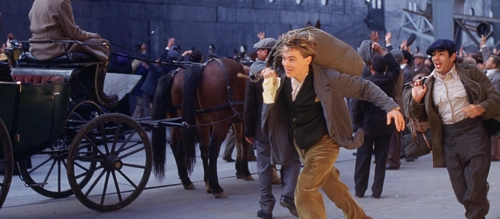Titanic (1997) Review

Titanic (1997)
Director: James Cameron
Screenwriter: James Cameron
Starring: Kate Winslet, Leonardo DiCaprio, Billy Zane, Kathy Bates, Frances Fisher, Bernard Hill, Jonathan Hyde, Victor Garber, David Warner, Danny Nucci, Bill Paxton, Louis Abernathy, Gloria Stuart
In a world where anyone with access to the internet can make their voices heard and contribute to public discourse, giving second by second updates on everything from breaking news to award’s show results, the pendulum of public opinion can swing wildly from one extreme to another in the time in takes to press send. Word of mouth, though, can spread like wildfire too, and even when the internet was in its infancy public discourse had a habit of giving us all whiplash, especially when the thing being discussed was a cultural phenomenon – impossible to ignore.
In December of 1997, when James Cameron’s hotly anticipated Titanic finally hit theaters, the backlash against what was at the time the most expensive movie ever made was swift and immediate and even to this day, it seems impossible for everyone to reach a consensus on it. There was already a sort of mythology surrounding the film even before it premiered, owning to a ballooning budget, an extended shoot and a delayed release date. According to reports at the time, it seemed like no one really knew what to expect from Titanic when it finally made landfall. But when it did, the film was an instant hit with an unprecedented box office performance. Many moviegoers went back, week after week, for repeat viewings. It was the first film to make over one billion dollars at the global box office and held that rank for over a decade, until Cameron himself broke the record with the release of Avatar in 2009. At the 70th Academy Awards, Titanic was nominated 14 times – winning 11 Oscars, including Best Picture. Its end credit song, “My Heart Will Go On” by Celine Dion, became one of the best selling singles of all time.
Despite initial rave reviews, Titanic had its detractors. Some saw the film as nothing more than a “chick flick,” a perception that was obviously heightened by the fact that one of the film’s stars, Leonardo DiCaprio, who was only 23 at the time, was every teenage girl’s crush, while others saw it as an empty spectacle with embarrassing dialog and cartoon villains.
In the nearly 27 years since its release, people have continued to flip flop on the film. British magazine Empire even changed its star rating of Titanic three times, from five to four stars, and then back again. While Janet Maslin of The New York Times called Titanic, at the time, “the first spectacle in decades that honestly invites comparisons to Gone With the Wind.” Filmmaker Robert Altman said in 2002 that Titanic was “ridiculous.”
Given the state of the film industry in 2024, it might be the perfect time to revisit Titanic, to truly appreciate its monumental achievement in a way that some were unable to before. Considering the state of the film industry now, when studios rarely take risks and decisions are made by Wall Street CEOs that have no idea how to make movies and certainly don’t know what people actually want from them, we might be able to see Titanic more clearly now. It remains one of the greatest cinematic achievements in film history and that’s because, regardless of public perception and in spite of it being one million things at once, Titanic works.
James Cameron begins his three-hour epic in present day 1997, with underwater explorer and fame seeker Brock Lovett (Bill Paxton) and team exploring the wreck of the RMS Titanic, the infamous ocean liner that sank back in 1912, killing 1,496 passengers. While the wreck is eery and quiet, the weight of the tragedy is lost on Lovett, who monologues about it for the video camera he’s recording from with mock sorrow and awe. Pressing stop, he remarks, “Alright enough of that horse shit.”
What Lovett really wants, and what’s he has been unable to locate, is the fictional Heart of the Ocean, a blue diamond cut from Louis XVI’s necklace that was said to have gone down with the ship. What Lovett discovers, however, is a nude drawing of a woman wearing the necklace. Seeing the drawing on television, 100 year old Rose Dawson Calvert (Gloria Stewart) contacts Lovett to tell him that the woman is her. Eager to know if she knows what happened to his treasure, Lovett implores Rose to tell him about the sinking and her survival. In relaying her experience and transporting us back to 1912, Rose helps Lovett to truly understand, for the first time, what Titanic really means, and gives us an emotionally satisfying and cathartic experience of love and loss. A formative experience for many young people in the late 1990s, Titanic shows us what it means to survive and what it means to be truly saved.

Brock Lovett might not know what Titanic means, but Cameron certainly does, and it’s undeniable that his obsession with the real-life sinking is one of the reasons this film was successful and manages to resonate as much as it continues to. The details are impeccable, from the production design to the costumes, to the minute by minute account of what led to the sinking and what happened after. Of course, it’s not all historically accurate, but there is a sense of reality to it that allows us to fully immerse ourselves in the experience. Cameron takes a historical tragedy that exists for the most part in black and white and makes it real to us, filled with light and color. The make-up and hairstyling in Titanic is particularly dazzling, with red and chestnut locks of Frances Fisher, playing Rose’s mother Ruth, and Kathy Bates, the real-life Unsinkable Molly Brown, as vibrant as technicolor. Everyone looks so good in costume, dripping in handsewn beading and snow-white lace.
But while Cameron was obviously meticulous in his details, it wasn’t just for the sake of accuracy. Titanic’s spectacle, its sinking shown in painstaking detail, is to dispel the idea in Lovett’s mind that Titanic is history – that it’s just a story. Cameron juxtaposes these horrors with the clinical and crass way Lovett’s team member Louis (Louis Abernathy) shows Rose his simulation of the sinking. Cameron draws attention to the emptiness of these details, that knowing how something works mechanically is no substitute for experiencing it. In this way, Titanic is aware of its spectacle and yes, that spectacle is breathtaking and thrilling, but it is also horrifying. It’s not there just to be there. There’s a real sense of loss and pain as we watch the ship sink, as we witness people freeze to death. It doesn’t feel cheap or exploitative.
Titanic creates a sense of urgency and tension that never goes away, no matter how many times you see it. Its runtime is justified because of Cameron’s confidence as a filmmaker and his ability to maintain balance regarding tonal shifts and pacing. In order to make the end work, to build up to the inevitable, Cameron understands that slow and steady wins the race.
There’s a hopefulness to the beginning of this film as Rose begins her story, when we meet her, now 17 and played Kate Winslet, as she gets ready to sail back to America with her mother and her rich, insufferable fiancé, Cal Hockley (Billy Zane); when we meet Jack Dawson and his friend Fabrizio (Danny Nucci) as they win their way onto the Titanic in a game of cards, sharing with each other their hopes and dreams for the future. James Horner’s now-iconic score is so crucial in these moments. It’s optimistic and moving and feels as wondrous as the size and splendor of the ship itself. For repeat viewers of Titanic, the simple melody feels almost nostalgic, conjuring intense emotions of not just the film but of the experience of watching it. To compliment this, Cameron’s camera is constantly moving and gliding over the crowd, tracking the people and the cars and the jittery excitement of it all.

As the second half of the film begins, seeing that iceberg slam into the ship is genuinely heartbreaking. That’s because of the work Cameron puts into its buildup. We know these people now. They’re not just names on the yellowing pages of a ship manifest. It is the beginning of the end and everyone knows it, as the ship’s designer Mr. Thomas Andrews, played with such quiet dignity and kindness by Victor Garber, solemnly and matter of factly states, “From this moment, no matter what I do, Titanic will founder.” Cameron takes a very pointed aim at the arrogance of those at the time who felt that Titanic could never sink, a basic fact their own arrogance blinded them to. It’s a tragedy of our own making.
Because Cameron takes the time to show us all of the ship’s splendor, including its fine suites and promenades, it is that much more potent when it is all destroyed and, with it, the notion that there is any real difference between first class and everyone else ceases to exist. Rose’s remark in the present day that the china had never been used is juxtaposed with that same china toppling over and smashing onto the floor as the ship begins to sink. Everything comes back again at the end, twisted and distorted from a dream into an utter nightmare. When Jack and Rose hang on for dear life at the bow of the ship, Rose remarks, with a smile, that this was where they first met.
Part of why Titanic endures is because of its love story, because it is melodramatic and enduring and makes us feel. The film is anchored by Rose and Jack and their love for one another. Kate Winslet and Leonardo DiCaprio win our hearts almost instantly from their first meeting, when Rose hangs off the back of the ship, not really wanting to die, but desperately trying to escape the reality of her life, and Jack saves her. There is something palpable in their chemistry and their desire to stay together, to save one another, that only works because we truly believe it. No one can watch the moment when Rose, in a lifeboat, jumps out and runs back to Jack, intent on staying with him even if it means she is going to die, and not think about someone they love and come to the conclusion that they would, without question, do the exact same thing. It’s so interesting to watch DiCaprio now considering the impressive career he has gone on to have. That talent and promise is evident in Titanic, even though his charm and ability as a romantic lead is something he has always worked to distance himself from. Our two romantic leads are supported by a strong and memorable ensemble, but in the end the film belongs to Kate Winslet and her transformation from a society girl who feels stuck in a life she doesn’t want to a true survivor, brave and determined, who is reborn in the shadow of the wreckage.
Titanic would not have the effect that it does without Cameron’s larger than life ambitions as a filmmaker and his innovative work with special effects. Titanic endures because of its craftsmanship. Cameron not only broke new ground technically, but he also knew when and how to use those techniques. Titanic utilized a number of different special effects from miniatures to blue screen to water tanks. It was a massive undertaking that somehow paid off, and the film looks just as good if not better than most modern blockbusters.
The forces that came together to make Titanic don’t exist anymore, just as the culture that received it in 1997 has evolved. What remains, however, is the film itself. It has never gone away, not really. Titanic imbedded itself in the zeitgeist in a way that few films could ever hope to do now. It has been referenced and spoofed in dozens of movies and TV shows, from ‘Rugrats’ to ‘Gilmore Girls’, and even as recently as last year in the romantic comedy Anyone But You. It is filled with iconography that has never faded, images anyone would recognize immediately, from the hand print on the car window, dripping in sweat and fog, to Jack’s declaration that he’s the “King of the world!” The differing views on the film may be hard to explain, but its popularity never has been. Titanic is so many things – a disaster movie, a sweeping romance, a historical epic – all wrapped into one. It’s a testament to what movies can do because it moves us. It makes us feel deeply and will most certainly never let us go.
Score: 24/24

